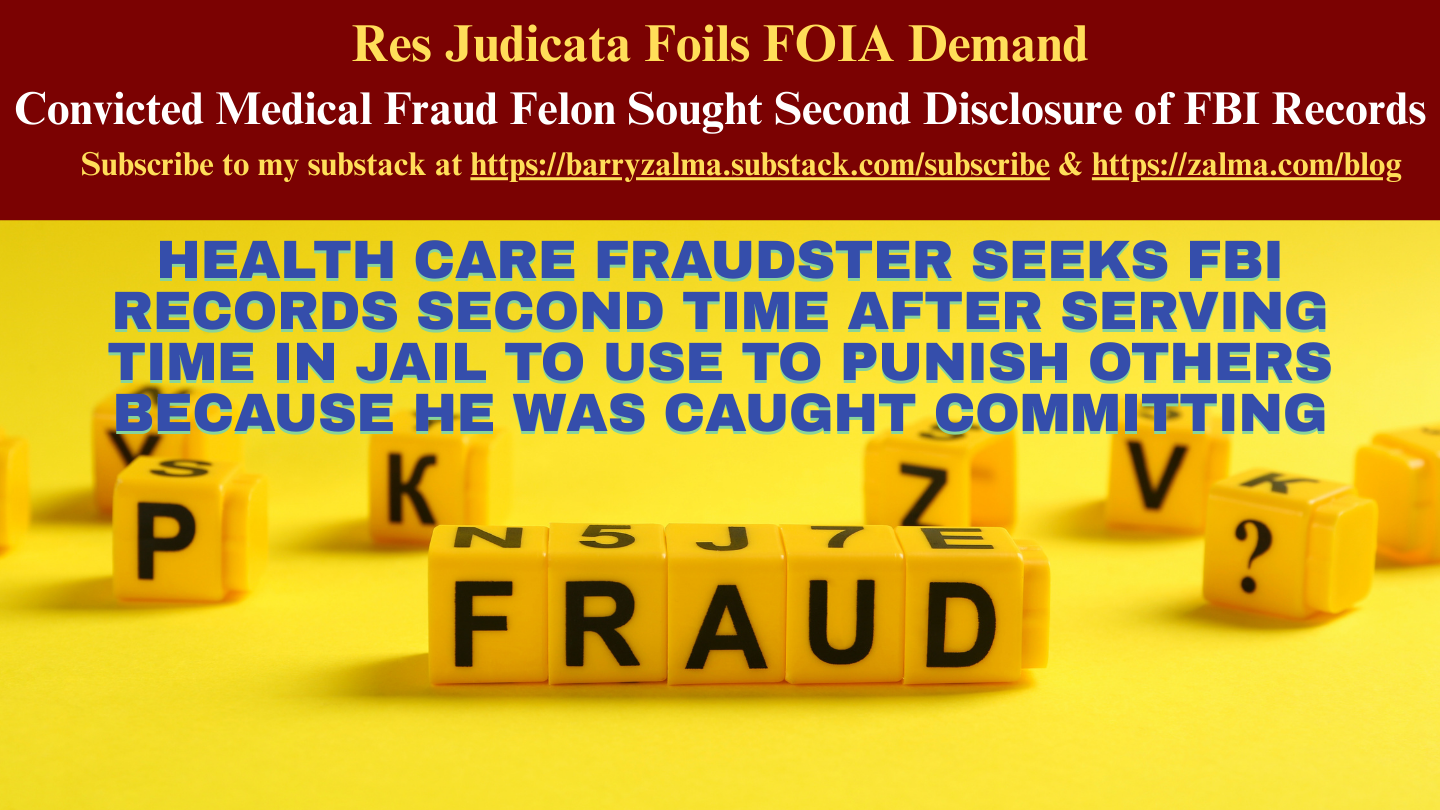-
Notizie
- EXPLORE
-
Pagine
-
Gruppi
-
Events
-
Blogs
-
Marketplace
-
Offers
-
Jobs
-
Developers
Res Judicata Foils FOIA Demand

Convicted Medical Fraud Felon Sought Second Disclosure of FBI Records
Read the full article at https://www.linkedin.com/pulse/res-judicata-foils-foia-demand-barry-zalma-esq-cfe-utf9c, see full video at and at and at https://zalma.com/blog plus more than 4900 posts.
Serving Time in Prison Doesn’t Give Fraudster Right to FBI Records,
Post 4914
The United States Department of Justice Federal Bureau of Investigation’s moved to dismiss plaintiff’s complaint pursuant to Rule 12 of the Federal Rules of Civil Procedure. Plaintiff Joseph Mermelstein brings this Freedom of Information Act (“FOIA”) action seeking records from the Federal Bureau of Investigation (“FBI”).
In Joseph Mermelstein v. United States Department Of Justice Federal Bureau Of Investigation, No. 23-CV-06779 NCM) (ST), United States District Court, E.D. New York (October 1, 2024) resolved the motion.
BACKGROUND
In July 2023, plaintiff submitted a FOIA request to the FBI for “all records” relating to plaintiff. Through the 2023 Request, plaintiff seeks production of records relating to plaintiff’s indictments and convictions in federal court for medical insurance fraud, for which he was incarcerated until 2015.
Specifically, the 2023 Request seeks records that included any conversations between plaintiff and another named individual between October and December 2005 (the “2005 Records”).
Plaintiff previously filed a separate FOIA action against the FBI in 2019. Mermelstein v. U.S. Dep’t of Just., Fed. Bureau of Investigation, No. 19-cv-00312 (E.D.N.Y.) (“Mermelstein I”). On appeal, the Second Circuit affirmed the district court’s summary judgment in favor of the government. Mermelstein v. U.S. Dep’t of Justice, et al., No. 22-cv-00816, 2023 WL 2977791 (2d Cir. April 18, 2023).
DISCUSSION
The FBI moved to dismiss plaintiff’s complaint on the basis of res judicata because the matter in controversy had already been adjudicated. A party cannot avoid the preclusive effect of res judicata simply by asserting a new theory or a different remedy.
To prevail on claim preclusion, a party moving to dismiss must establish
1. a prior final judgment on the merits, by a court of competent jurisdiction,
2. in a case involving the same parties or their privies, and
3. involving the same cause of action.
The parties do not dispute that Mermelstein I involved a final judgment on the merits by a court of competent jurisdiction and involved the same parties as the present action. The question therefore is whether the cases involve the same cause of action.
The FBI contended that plaintiff’s complaint in this action is merely an attempt to relitigate the same issue that arose in the prior action: the adequacy of the FBI’s search in response to the 2018 Requests.
The Court was satisfied that it may judicially-notice the public docket filings in Mermelstein I– to aid its evaluation of defendant’s claim preclusion challenge.
SAME CAUSE OF ACTION
To assess whether the causes of action are the same, the Court looks to whether both lawsuits arise from the same transaction or involve a common nucleus of operative facts. On their face, the Requests are not identical. The 2023 Request arises out of the government’s criminal prosecution of plaintiff for fraud, on the basis of which he was convicted and sentenced to prison until 2015. The complaint in the prior action lists identical facts.
The causes of action are therefore the “same” for purposes of claim preclusion.
NEW EVIDENCE
As a general rule, newly discovered evidence does not preclude the application of res judicata. Only where the evidence was either fraudulently concealed or when it could not have been discovered with due diligence in the prior action will exceptions to that general rule apply.
Inconsistencies proposed by Plaintiff did not indicate that the FBI fraudulently concealed the 2005 Records. Instead, plaintiff merely noted that he discovered gaps in the responsive documents that could have been raised in the prior litigation. The USDC noted that Plaintiff provided no support for his attempt to re-open that litigation in order to address an issue raised by another litigant in another forum. To the extent plaintiff attempts to continue litigating the sufficiency of the FBI’s search, his claims are barred.
Therefore the USDC granted defendant’s Motion. Plaintiff’s complaint was dismissed in its entirety with prejudice.
ZALMA OPINION
Health insurance fraud, the crime for which the Plaintiff was convicted and served time in prison, is very profitable. As a result the convicted felon has sufficient funds to retain counsel to attempt to gain information from the FBI to use that information against others who may have been responsible for his incarceration. The FOIA requests were precluded because he used the same requests and litigation to use to defend his criminal cases. He lost in the USDC and in the appellate courts and his attempt was rejected appropriately as res judicata.
(c) 2024 Barry Zalma & ClaimSchool, Inc.
Please tell your friends and colleagues about this blog and the videos and let them subscribe to the blog and the videos.
Subscribe to my substack at https://barryzalma.substack.com/subscribe
Go to X @bzalma; Go to Newsbreak.com https://www.newsbreak.com/@c/1653419?s=01; Go to Barry Zalma videos at Rumble.com at https://rumble.com/account/content?type=all; Go to Barry Zalma on YouTube- https://www.youtube.com/channel/UCysiZklEtxZsSF9DfC0Expg
Go to the Insurance Claims Library – https://lnkd.in/gwEYk
We are 100% funded for October.
Thanks to everyone who helped out. 🥰
Xephula monthly operating expenses for 2024 - Server: $143/month - Backup Software: $6/month - Object Storage: $6/month - SMTP Service: $10/month - Stripe Processing Fees: ~$10/month - Total: $175/month
- Art
- Causes
- Crafts
- Crime
- Dance
- Drinks
- Film
- Finance
- Fitness
- Food
- Giochi
- Gardening
- Health
- Home
- Literature
- Music
- Networking
- Paranormal
- Altre informazioni
- Politics
- Elenco
- News
- Party
- Science
- Religion
- Shopping
- Sports
- SyFy
- Politically Incorrect
- Philosophy
- Theater
- Technology
- Wellness



